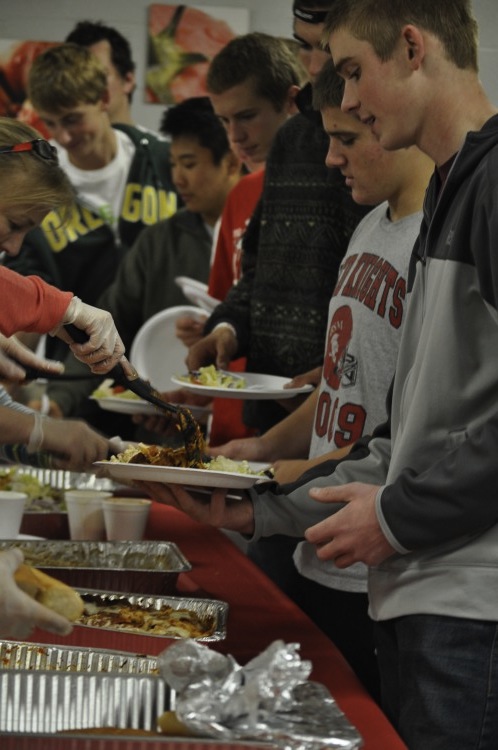Many athletes at Benilde-St. Margaret’s start out their day eating lots of fruits and vegetables in preparation for game days. Protein sources, such as Special K bars and smoothies, play a large role in athletes’ diets. They focus on staying hydrated and constantly drinking water during the day. Many BSM students strive towards a healthy game day diet.
There are three important rules for every athlete to follow: hydration, nutrition, and sleep. Dehydration impairs both physical and mental performance. Nutrition allows athletes to recover from the body’s stress which allows progress, and adequate sleep improves an athlete’s mood and alertness, along with their performance. “Sleep is very important. I try to go to bed by 9:30 p.m. the night before my meets,” junior Andrew Renier said.
The day before games and meets, athletes often partake in the act of “carbo-loading.” Pastas, bread, and rice are often eaten the day before sporting events because carbohydrates are an important source of energy. They are stored in the form of glycogen, which is used in the muscles and benefits an athlete’s performance. “If your glycogen stores are not full at the beginning of the game or race, your performance will be affected. A typical athlete depletes after an hour of continuous activity if their glycogen stores were full to begin with,” athletic trainer Ms. Kristin Gilbertson said.
Athletes’ meals are in smaller portions, and they often turn to sandwiches, fruit, and vegetables. “Game day is not a good day to try something new. Easily digestible and low acidic fruits are smart choices,” Ms. Gilbertson said.
Food should give the athletes enough energy without making them feel too full or heavy. Some students prefer to eat foods like salad with chicken before their game. “It gives me energy without feeling like I’m sinking,” senior Madison Winston, former captain of the swim team, said.
Athletes are encouraged to wait three to four hours after eating before participating in athletic activity. It is also recommended that they continue to hydrate throughout the day. On game days, women should drink two liters of water while it’s recommended men drink three liters. “Within the last three hours before a cross-country race, only eat small snacks of protein and drink water,” Andy Renier said.
Maintaining these good eating habits are crucial for optimal performance. “When you forget to eat in terms of preparing for your race, it really does affect you, and you pay for it at the meet,” sophomore Dan Lennington said.
As a wrestler, nutrition often revolves around weight. As opposed to most other athletes, wrestlers eat based on what they want their weight to be. In most cases, wrestlers want to maintain a low weight. In order to do so, wrestlers tend to eat six small meals a day instead of three large meals. They eat sandwiches, chicken and pasta for protein. “Another great way to cut weight without your body noticing your hunger is by eating trail mix, carrots, broccoli, granola, and nuts,” junior Carter Burn said.
While some athletes learn about healthy eating from their coaches, others learn from their families. “My mom was a marathon runner, and she helps me out with my nutrition,” Renier said.
Other athletes may learn about a healthy diet through personal experience or health class. Through reading various articles and personal experience, Winston established a habit of eating healthy, and continues to maintain her healthy food choices whether it’s game day or not.
Sophomore Peter Thome, member of both boys’ hockey and tennis teams, claims not to have a balanced diet. On game day he tries to eat carbs and hydrate, although this routine may vary. “I’m probably not going to have Taco Bell before the game,” said Thome.
Although he recognizes learning healthy food habits in Ms. May’s health class, Thome found through personal experience, the food he eats on game day does not impact his performance.






































![Teacher Lore: Mr. Hillman [Podcast]](https://bsmknighterrant.org/wp-content/uploads/2025/03/teacherlorelogo-1200x685.png)




